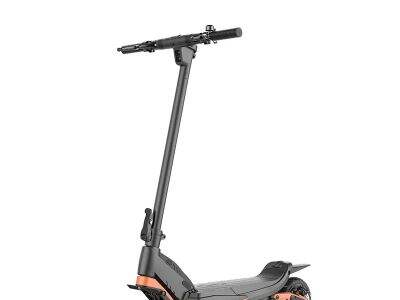Если вы являетесь владельцем электромопеда Zuboo, возможно, вы задаетесь вопросом, как правильно ухаживать за ним и эксплуатировать для достижения максимальной производительности. Также вас может интересовать, какое расстояние мопед преодолеет на одном заряде и как правильно его заряжать. Регулярное техническое обслуживание является ключом к приятной и безопасной езде, поэтому вот несколько базовых шагов по поддержанию вашего мопеда в хорошем состоянии. Мы подготовили несколько советов, чтобы помочь вам максимально долго и с удовольствием пользоваться вашим мопедом Zuboo.
Рекомендации по обслуживанию вашего электромопеда Zuboo
Первое, что вам нужно знать: ваш электросамокат Zuboo требует зарядки. Как и любой телефон или планшет, который вы используете сегодня, аккумулятор вашего самоката со временем разряжается. Помните о зарядке до полной разрядки батареи. Если позволить аккумулятору разрядиться до 0%, это может повредить его, и он будет работать хуже в дальнейшем. Гениальный способ — заряжать его, пока вы спите ночью. Это электрический мотоцикл в Нигерии означает, что каждое утро вы просыпаетесь с полностью заряженным самокатом, готовым к веселой поездке!
Поддержание чистоты вашего скутера Zuboo, свободного от грязи, также является важным аспектом его обслуживания. Однако, грязь и пыль могут попасть в мотор, что заставляет скутер работать излишне интенсивно, что нежелательно. Чтобы этого избежать, просто всегда вытирайте его тканью. Также не рекомендуется ездить на скутере в очень пыльных или грязных местах, так как это сделает его более загрязненным. Регулярная чистка вашего скутера продлит его срок службы и улучшит производительность.
Подзарядка вашего электрического скутера Zuboo
Правильная зарядка вашего электрического скутера Zuboo критически важна для поддержания его в отличном состоянии. Всегда используйте зарядное устройство, которое пошло вместе с скутером. Использование другого зарядного устройства может повредить батарею, после чего она перестанет работать. Другой важный момент — не заряжайте батарею слишком часто или редко. Зарядка до слишком высокого или низкого уровня повредит батарею и сократит её срок службы.
Первое, что нужно сделать для правильной зарядки вашего скутера Zuboo, — это выключить его. Это классический электрический мотоцикл делается для защиты аккумулятора во время зарядки. Затем, подключите зарядное устройство к розетке и аккуратно подсоедините его к аккумулятору мопеда. При правильном подключении зарядное устройство должно загореться, показывая, что оно работает и заряжает батарею. Подключите его на несколько часов или даже на ночь, в зависимости от того, сколько энергии требуется аккумулятору. Таким образом, ваш мопед никогда не разрядится в неподходящий момент, когда вы должны быть в пути.
Продление срока службы аккумулятора вашего мопеда Zuboo
Хотите максимально продлить жизнь аккумулятора вашего мопеда Zuboo? Вот несколько полезных советов. Во-первых, не заставляйте двигатель слишком сильно работать. Если двигателю приходится больше напрягаться при подъеме в гору или перевозке тяжелых предметов, это может быстрее разряжать аккумулятор. Старайтесь ездить по ровным дорогам и избегайте перевозки тяжелых грузов. Это электрический мотоцикл 2023 продлит срок службы аккумулятора и позволит вам долго наслаждаться ездой.
Хранение аккумулятора мопеда вдали от экстремальной жары или холода также может помочь продлить его срок службы. Жаркая или холодная погода может повлиять на производительность батареи. Если температура на улице слишком высокая, аккумулятор может легко повредиться от перегрева, а если слишком низкая, он плохо заряжается. Держите свой мопед в умеренной температурной среде, если это возможно, и постарайтесь избегать езды в жару или холод. Это поможет сохранить аккумулятор и его функциональность.
Какое расстояние может преодолеть мопед Zuboo
Расстояние, которое показывает, как далеко может проехать ваш электрический мопед Zuboo на одном заряде, является одной из самых важных характеристик для понимания. Это расстояние называется запасом хода. Оно будет различаться в зависимости от нескольких факторов, включая размер батареи, вес водителя и тип местности. Эти данные помогут вам планировать свои поездки соответственно.
При езде на мопеде убедитесь, что вы движетесь по ровным и гладким дорогам, чтобы максимально использовать запас хода. Не загружайте мопед тяжелыми вещами, так как это может снизить производительность из-за того, что мотору придется работать интенсивнее. Другая причина заключается в том, что высокая скорость может разряжать батарею быстрее, поэтому лучше ехать медленно. Если вы отправляетесь в длительную поездку, возьмите с собой зарядное устройство на случай, если батарея начнет разряжаться. Таким образом, вы не окажетесь в затруднительном положении далеко от дома.
Получение поддержки для вашего электромопеда Zuboo
Если у вас возникнут проблемы с вашим электромопедом Zuboo, вот несколько способов найти оптимальные решения. Убедитесь, что вы используете правильное масло. Там может быть очень полезная информация или ответ на распространенную проблему. Обратившись в службу поддержки клиентов, вы можете узнать, существует ли проблема с конкретной моделью.
Если вы не можете выполнить ремонт, подумайте о том, чтобы отвезти свой мопед в профессиональный сервисный центр. Эти специалисты смогут определить проблемы и предложить наиболее эффективные решения. Они являются экспертами в области мопедов и быстро вернут ваш Zuboo мопед в рабочее состояние. В целом, при правильном уходе и обслуживании ваш электрический мопед Zuboo должен прослужить много лет, обеспечивая вам множество захватывающих поездок!

 EN
EN







































